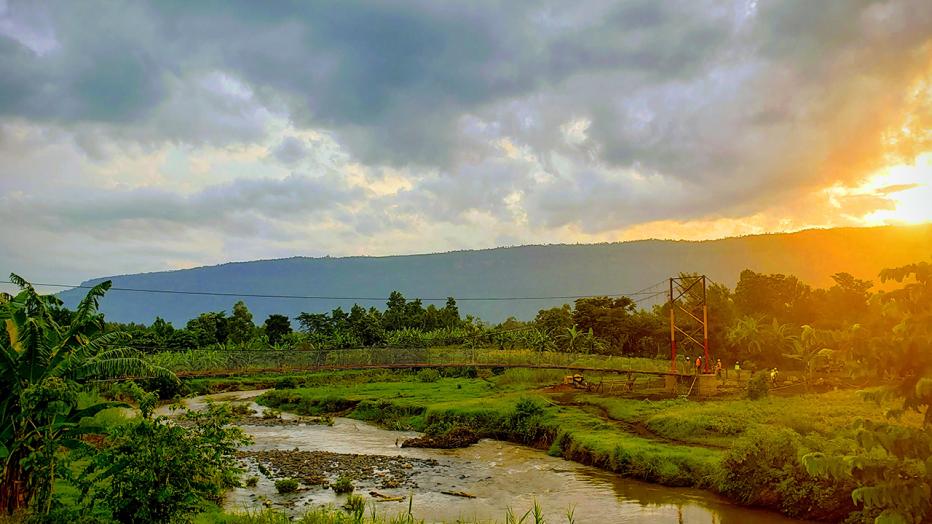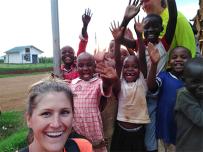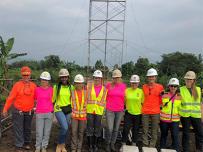
Erin James, a transportation engineer and project manager from our Denver, Colorado office joined forces with Bridges to Prosperity – a non-profit organization helping eradicate poverty caused by rural isolation with the design and construction of pedestrian footbridges – to build a bridge in Kibembe, Uganda, as part of the organization’s first-ever Women’s Suspension Build.
Kibembe sits on the bank of the Sironko River and floods for more than three months of the year, becoming dangerous to cross and eliminating residents’ ability to reach critical services. With the new footbridge constructed by the all-female group – including Erin and other volunteers from McElhanney, Kraemer North America and PCL Construction – more than 1,700 individuals, including over 300 children, now have a safe connection to a market, primary and secondary schools and medical centers.
Since 2014, Jacobs volunteers have improved community access on B2P builds in Panama, Nicaragua, Rwanda and several other locations. For Erin, who serves as the Communications Co-Chair for Jacobs’ Global Women’s Network, the Women’s Suspension Build marked her fourth B2P build. Below, Erin looks back on her experience in Kibembe.
It's incredibly difficult to come back to the life I've established in the States after living and working with people who have experienced life so differently. There are so many privileges and opportunities granted to me. Lately I've been feeling a mix of guilt, luck, somberness, appreciation, unrest and frankly, anger.
Why do I get the chance to succeed and prosper, while others in the world never have that shot? It seems like pure randomness that I was born into certain circumstances that differ so vastly from other parts of the world. The disparities in income, education, health, mobility and freedom I’ve witnessed are quite shocking, and I am more convinced than ever that I (we) need to do more to help others.
Nine other women from the contracting industry joined me to build the superstructure of the suspension bridge in two weeks' time, working hand-in-hand with local Kibembe community members who have directly benefited from a new connection between villages in their region.
Impossible choices were reality in Kibembe

he community has been working on the foundations of the bridge for two months leading up to our arrival, so they have been the unsung heroes of the build from the start. The Sironko District has two communities on either side of the Sironko River, one with access to a larger roadway network (important for market, trade, and access to cities) and the other with the Kibembe school and parish.
Several people, including children, have died in the past few years as a result from the swollen river.
Can you imagine showing up to school every day soaking wet in your school uniform because you had to swim across a treacherous river to get there? Would you even go to class? If the answer is no, you've just discovered one reason why education is a top focus for these remote communities.
If the rainy season lasts half the year and prevents you from going to class, you get 50% less education than others in the world. What if your child was sick, and the only way to get to the nearest clinic was across the river? Do you risk both of your lives to fight the swift current, hoping to get the medical attention your child needs? Or do you risk waiting it out and letting your child suffer from illness instead? These impossible choices provide the framework for B2P's mission.
Some people ask the question, "Why do people choose to live in areas that get flooded?" I believe this question comes from a place of privilege, where it may be easy for the people asking the question to readily mobilize and have enough money, education and other resources to plant roots in different places. When a home has been in your family for generations, you were born there, your family and your neighbors are the only people you’ve ever known, you don't have education to get a job, you don't have money to catch a bus or taxi elsewhere and you have family members depending on you to take care of them, it’s evident how the cycle of poverty and isolation continues to impact so many people globally.
The Kibembe experience

The people of Uganda were so welcoming to us, and their faces lit up with smiles as we got to know them through work and play. Their culture has so much emphasis on singing and dancing that I had to quickly overcome my self-consciousness to earn my spot on the team!
We fell in love with the children, who would sprint to the perimeter of our job site each day to watch us for hours on end, inquisitively observing each day’s progress, patiently awaiting the day they could run across the completed bridge. I also discovered that having an audience while performing ANY task can be quite unnerving, especially when a cast of sixty kids vehemently bursts into laughter with any mistake or shortcoming I would make on site! They quickly learned to pronounce my name, and in no time, “Erin” was the inadvertent source of entertainment each afternoon.
One of my favorite local foods from the trip was the Ugandan “Rolex” (not the fancy watch.) An omelet rolled inside fried flat dough was the perfect breakfast to keep our energy up as we performed construction tasks all day. It’s believed that the word Rolex comes from “rolled eggs,” which makes a lot of sense. I tried to make the dish upon my return, but sadly, my cooking skills didn’t compare to Rose – who cooked multi-course meals for more than 15 people each day on just one gas stove with a couple of metal bowls.
We were also fortunate to share a house with inside toilet facilities and several cots and beds. Though I accumulated over 300 individual bug bites during the trip, and one or two cockroaches may have found their way into my luggage, we still felt like we were royalty in the village by comparing our accommodations to that of others’. We were constantly reminded that most of the community lived in mud houses with dirt floors and no windows or beds. Even when filtering our water, we felt an enormous sense of guilt, knowing full-well that the community drank, cleaned with, cooked with and bathed in the water from the nearby stream.
The powerful first Women’s Build

One of the interesting parts about this build was that we were a team of female engineers, and the community was puzzled that we could have so many of us who traveled to Uganda to build this bridge together. This has been my fourth build with Bridges to Prosperity, but this was the first time I’ve been with an all-woman team. I’m happy to report that the team was very easy to get along with, had a sense of adventure and were very professional and accomplished in their careers. I learned so much about construction through working with them, and it was easily the most organized and safe build I’ve been a part of.
As a team, we all allowed one another to try each construction activity and take ownership of certain tasks. We communicated well and looked out for the safety of not only our own team but everyone working on site. I felt particularly proud when one of the community members reminded me to put on my safety glasses on the second-to-last day of the build!
The inauguration was a beautiful ceremony with performances from the community and speeches from government officials. One of the girls from Kibembe even recited a poem about transport. I was completely overwhelmed with emotion watching the two communities cross back and forth over the completed bridge and still get chills and choke up when talking about it.
Personally, I’ve learned a lot about some of the more technical components of the bridge design and was able to take ownership of the surveying for this build (setting the sag of the main cables and the safety line). I also drew on past experiences to efficiently help the team progress on our tight schedule. I’ve become a more confident and technically-capable bridge-builder on this trip, and I plan to take everything I’ve learned to help other teams in the future.
A song was playing on the radio during the seven-hour drive from Sironko backto Kampala that caught my attention. The lyrics read, “How old would you be if you didn’t know when you were born?” I thought about the fact that many people in these isolated communities do not know or care when they were born, and they choose to focus on the gift that is each new day. They live in the present, and there is something precious, primal, and comforting in knowing that all you can count on is your time today.
This trip brought me back to basics and helped me strip down the layers of abstract complexities I’ve built in my life. I am so thankful to be able to have experienced this trip and have walked away with clarity and peace. I know that as global citizens we are moving in the right direction, and I am comforted knowing that people around the world are making direct, positive change to advance human progress.
A transportation engineer and project manager at Jacobs, Erin James leads teams while designing and analyzing roadways, interchanges, intersections, trails and parking lot systems. She obtained her bachelor’s in civil and environmental engineering from The Pennsylvania State University (Penn State) in 2012. With a zest for advancing STEM education for girls, Erin volunteers whenever she can within the communities she works and also co-leads communications for Jacobs’ Global Women’s Network. She’s a passionate volunteer and advocate for the nonprofit Bridges to Prosperity, and has served in project manager and technical mentor roles on trips to Uganda, Rwanda, Panama and Bolivia to provide access to disadvantaged communities.












































